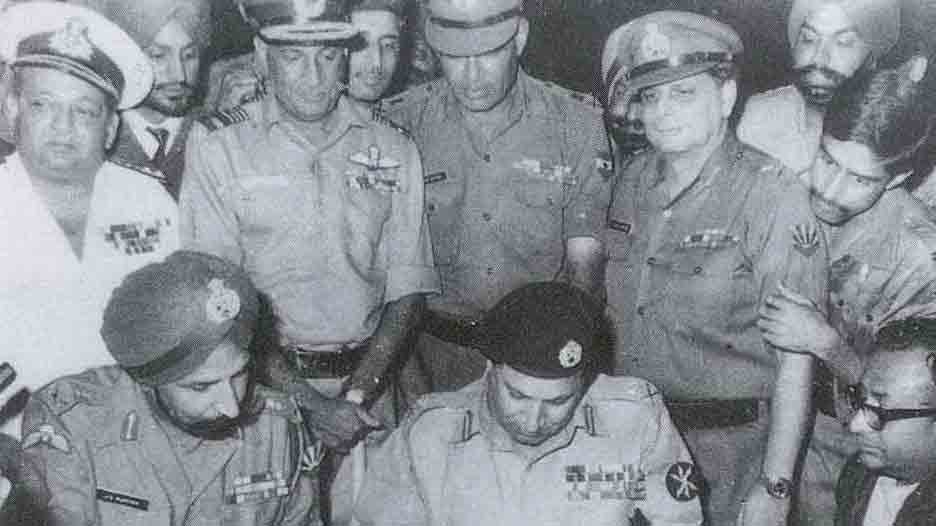A number of books have been published to coincide with the 50th anniversary of the 1971 Indo-Pak war, recalling stories of grit and glory and also providing anecdotal accounts of its heroes.
While Penguin Random House has published Ian Cardozo's 1971: Stories of Grit and Glory from the Indo-Pak War; 1971: Charge of the Gorkhas and Other Stories by Rachna Bisht Rawat; and The Lone Wolf: The Untold Story of the Rescue of Sheikh Hasina by Neha Dwivedi; Speaking Tiger has come out with Major General Vijay Singh's book on his father Hamir Singh's experience - POW 1971: A Soldier's Account of the Heroic Battle of Daruchchian.
In his collection of true accounts, decorated war veteran Major Gen Cardozo recounts what really happened during the 1971 as he pieces together every story in vivid detail through interviews with survivors and their families.
He says India's strategy and conduct of the war was exceptional. The war was won by India in a span of just 13 days. But India lost 3,843 servicemen while 9,851 were wounded - some of them disabled for life.
Cardozo was himself injured in the battle of Sylhet in Bangladesh, but overcame the disability of losing a leg and became the first disabled officer of the Indian Army to be approved for command of an infantry battalion and brigade.
He further writes how 'jugaad' was the order of the day, and RCL guns and mortars were moved on bullock carts and cycle rickshaws, and rivers were crossed on improvised rafts made from bamboo and trunks of banana trees.
Cardozo also raises several questions in the book.
"As a matter of reflection, one wonders what would have happened had Prime Minister Indira Gandhi delayed the ceasefire in the west for a couple of more days. The psychological pressure on Pakistan would have been colossal. Pakistan had her back to the wall, and even they must have wondered why we left them off the hook!" he writes.
Another point he raises is: "It has been fifty years since that outstanding victory. The question is, have we learnt the lessons of history? Are the armed forces well equipped to fight a two-front war against China and Pakistan? These are questions that need to be asked and answered as war clouds once again gather on our borders."
Author Rawat focuses on the "human stories that traditional war histories tend to leave out".
The main story Charge of the Gorkhas in her book is about the gutsy warriors of 4/5 Gorkha Rifles who attack an enemy position, fortified by machine guns, with naked khukris in their hands and the war cry of Jai Mahakali! Aayo Gorkhali on their lips.
Rawat hopes that telling these stories will contribute to keeping the memories of the heroes alive. "Because soldiers don't die on battlefields; they die only when an ungrateful nation forgets their sacrifice. Remembrance is all that we can offer them in return for what they did."
POW 1971 talks about the tragic tale of the INS Khukri and its courageous captain, who went down with his ship, to how a battalion of the Gorkhas launched what is accepted as the last khukri attack in modern military history.
As the young Company Commander of the Muslim Company of 14 Grenadiers (an infantry battalion), Major (now Brigadier) Hamir Singh led the ill-fated attack on Daruchchian, across the Line of Control in Kashmir, in which 8 officers, 7 JCOs and 149 Other Ranks were killed, injured or captured.
Major Hamir Singh was himself grievously injured and taken Prisoner of War (POW). He spent a year in Pakistan as POW until he was repatriated back to India on December 1, 1972.
Last seen involved in a hand-to-hand fight with the Pakistanis, Hamir Singh's whereabouts were not known and he was declared 'Missing in Action' until Pakistan acknowledged him as a POW in February 1972.
On his return to India, he was awarded a Vir Chakra based on the testimony of the men who fought and were captured with him at Daruchchian.
The book is primarily based on Hamir Singh's account and gives a view of war, and of life as a POW.
Dwivedi brings to centrestage the life of Colonel Ashok Tara, who rescued Sheikh Hasina and the family of Sheikh Mujibur Rahman from certain death at the hands of the Pakistan Army during the war.
The book goes on to say how after the defeat of Pakistan, what was now left for the Indian troops to do was to control events such as the crowd's hostility and the restoration of law and order in the city.
"By the early hours of 17 December 1971, 14 Guards had implemented all relevant protocols to secure the perimeter. However, on the same day, around 9 a.m., while Ashok was busy reassessing the arrangements with one Maj. Shanti Khanna, he was hastily summoned by his commanding officer, Lt Col V.N. Channa.
"Not expecting anything serious, as the unit had finally heaved a huge sigh of relief, Ashok assumed he may want to speak to him about the security arrangements of the departing officials and hurried over to meet him," it says.
Col Tara was informed that Mujib's family - his wife and children, including his daughter, Sheikh Hasina - had been held hostage by a contingent of the enemy troops since March and were still not released. Mujib was also yet to be released by the Pakistan Army.
Col Tara won the battle of guts and wits all by himself.
"Mrs Sheikh Mujibur Rahman, almost unbelieving of the fact that they had really been freed from their ordeal, embraced Ashok at once, saying, 'God Himself has sent you to save us You are like my son!' Ashok smiled as he looked around and saw the immense sense of relief wash over the faces of the rest of the members of Mujib's family, which included his daughters Sheikh Hasina, Sheikh Rehana and son, Sheikh Russel," the book says.










